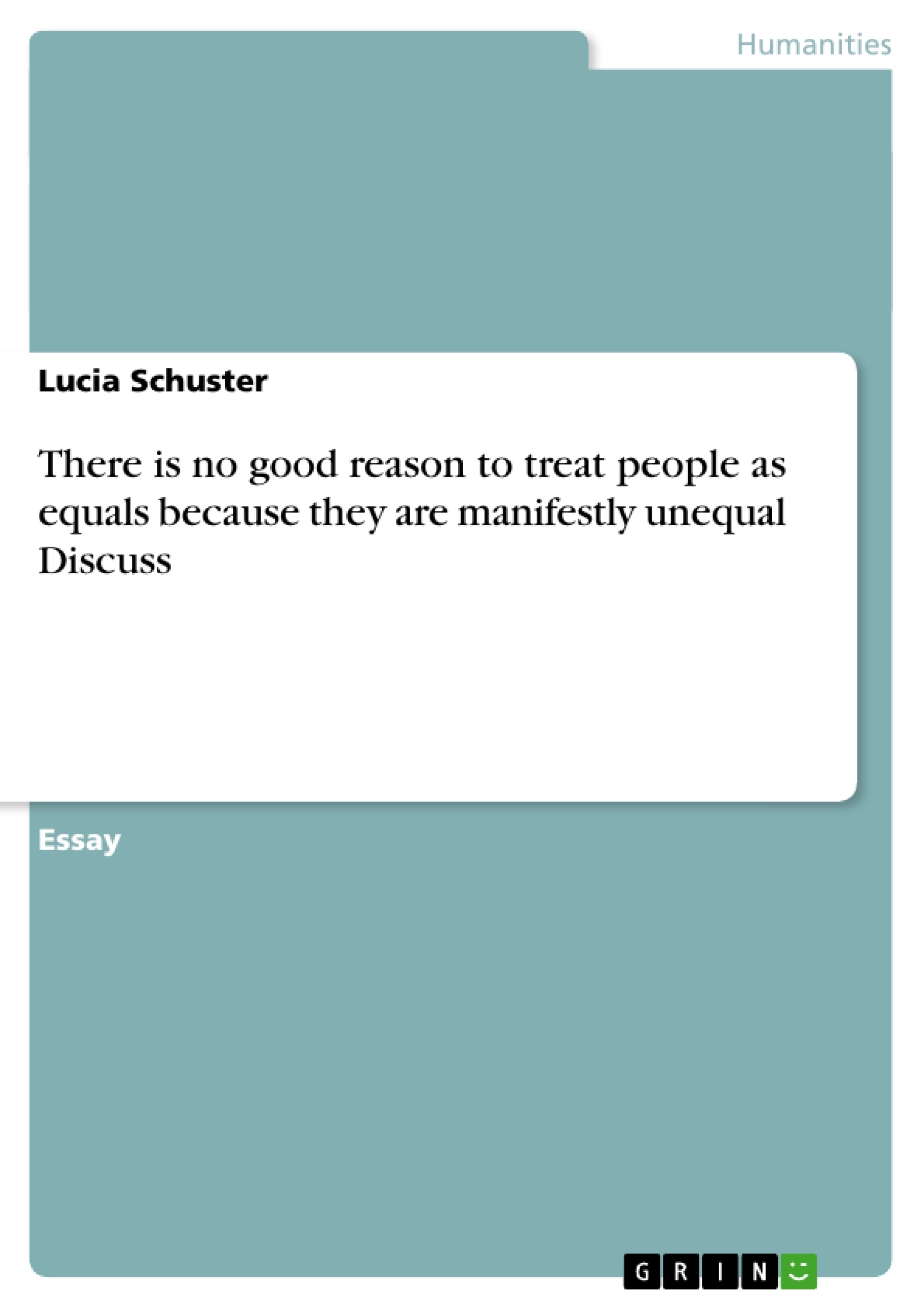Humanity went through centuries of slavery, Nazism, neglecting of women rights and
discrimination of disabled. All those issues, now regarded as unquestionably wrong in the
Western Hemisphere, were often based on arguments of manifested differences between
people. Even though people are still as different in characteristics, endowment and lifestyle as
they ever have been, the attitude of many societies towards those topics drastically changed
over the last centuries. There must be some significant reasons to regard humans now as
fundamentally equal although they are dissimilar in so many ways. The question is still a
fascinating one: Is it therefore justified to treat all people equally and is that a goal worth
achieving? It is legitimate to consider people equal in certain areas whilst unequal in others. I
will argue that there are good reasons to treat people equally as they are equal in some
respects and treat them unequally because they are unequal in others but also to treat
people equally although they are unequal. However for this purpose my essay will be
organized in three sections. In the first passage I will defend equality of rights, equality before
the law and equality in politics, backed up by the principle of Equality of Respect or
Universal Humanity. Starting of with equality of resources in the second part, I will also
examine equality of happiness and welfare. In the third paragraph the debate over equality of
opportunity and equality of a basic living standard marks the end of my discussion. [...]
Table of Contents
- Equality of Rights, Equality before the Law and Equality in Politics
- Equality of Respect or Universal Humanity
- Equality of Resources
- Equality of Wealth
- Equality of Welfare or Happiness
- Equality of Opportunity
- Equality of a Basic Living Standard
Objectives and Key Themes
This essay examines the concept of equality, exploring whether it is justified to treat all people equally and if this is a worthwhile goal. It argues that people should be treated equally in some respects and unequally in others, while also advocating for treating people equally despite their inequalities.
- The principle of Equality of Respect or Universal Humanity
- The challenges and limitations of achieving equality of resources, particularly concerning wealth and welfare
- The debate over equality of opportunity and its potential for perpetuating existing inequalities
- The moral imperative for ensuring a basic living standard for all individuals, recognizing the inherent inequalities in the distribution of natural talents and opportunities
- The role of the state in promoting equality and addressing the unintended consequences of social structures
Chapter Summaries
The first part of the essay defends equality of rights, equality before the law, and equality in politics, grounding this argument in the principle of Equality of Respect or Universal Humanity. It emphasizes the shared human characteristics that justify treating individuals equally, regardless of their individual differences.
The second part delves into the concept of equality of resources, specifically focusing on equality of wealth. It argues that striving for equal wealth distribution is both impractical and potentially detrimental to individual liberty. The essay explores the psychological and practical challenges associated with redistribution of resources, particularly within a capitalist system.
The third part examines the principle of equality of welfare, measuring the extent to which individuals can fulfill their own valued goals. The essay recognizes the inherent differences in individual needs and preferences, highlighting the complexities of achieving equal happiness and satisfaction.
The fourth part discusses the concept of equality of opportunity, arguing that it seeks to provide equal legal access to social positions based on merit and talent, irrespective of social background. However, the essay highlights the potential for equality of opportunity to perpetuate existing inequalities by valuing certain talents more than others and failing to adequately address the impact of family and social environment.
Keywords
This essay explores key themes such as equality of rights, equality before the law, equality in politics, equality of resources, equality of wealth, equality of welfare, equality of opportunity, and equality of a basic living standard. It critically examines the principles of Equality of Respect or Universal Humanity and the challenges and limitations of achieving equality in a complex and unequal society.
- Citar trabajo
- Lucia Schuster (Autor), 2002, There is no good reason to treat people as equals because they are manifestly unequal Discuss, Múnich, GRIN Verlag, https://www.grin.com/document/13833



